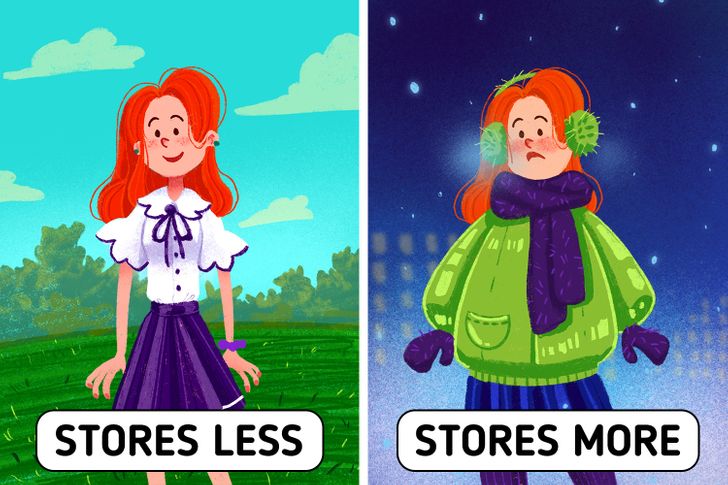People often blame the holiday season for winter weight gain, and they have a valid reason: Holidays and revelry are perfectly viable culprits. But, according to various studies, this problem is more than overeating at a Christmas party.
With the lack of sunlight and our survival mechanisms at work, weight gain seems not only real but difficult to avoid.
We did our homework and are now fully prepared for next winter, and we encourage you to join us on this journey.
5. Our Metabolism Gets Boosted

In winter, our metabolism noticeably improves: our body tries to burn more energy to stabilize its temperature and stay warm.
And that means we need more food for those extra energy taxes. Naturally, we feel the need to eat more to keep up with our new metabolic rate.
Solution: Keep yourself and your surroundings warm and comfortable to minimize the resources your body spends keeping warm so you don’t need extra food.
Fortunately, it is not that difficult these days with our temperature-controlled environment.
4. Our Cells Store More Fat

A study revealed that our fat cells react positively to sunlight. The cells closer to the skin, when exposed to the sun, become smaller and therefore store less fat.
So, on the other hand, a lack of sunlight can increase the ability of cells to store fat, making us more receptive to weight gain.
Solution: Get as much sun exposure as possible. Get up early for a better chance of watching the sunrise and spending more time outdoors. Squeeze as much sunlight as you can out of the day!
3. We’re Getting Ready For “hibernation.”

Humans are more similar to bears than we realize: we both try to sleep during the colder months. Science suggests that in the cold, our primitive instincts kick in and we unconsciously try to store calories, like bears preparing for hibernation.
Somewhere inside us we still live with the fear of not being able to find the necessary nutrients when food is scarce in winter.
Solution: relax. There is nothing you can do about it. So, snuggle up in blankets with your favorite Netflix series and hot chocolate, and pretend you’re a bear; the only difference is that you stay awake half the time.
2. We Try To Get Warm Via Eating

The cold can trigger some behavioral changes that stimulate fat storage. Specifically, eating is a way to raise our body temperature, so when it gets cold, we are likely to search for food.
When our body is metabolizing something, it naturally generates heat, so we crave more food to help warm us. We also tend to eat more “comforting” foods, like hot bread and cakes.
Solution: Eat foods that take longer to digest, such as foods rich in healthy fats, protein, and carbohydrates, as they will keep you warm for longer.
A special mention goes to bananas, which contain vitamin B and magnesium, which help the thyroid and adrenal glands to regulate body temperature.
1. We Get More Sleepy

The lack of sunlight that we experience when days get shorter in winter affects our hormones. Our pineal glands respond to the deficiency of sunlight by producing more melatonin, responsible for our sleep-wake cycle.
Therefore, we tend to feel more sleepy, while higher levels of melatonin can increase our appetite. Basically, we find ourselves eating more and moving less during the cold months.
Solution: Try to control your melatonin production by eating foods that contain it and by exposing yourself to sunlight.
Tomatoes, olives, cereals, and raw milk have significant amounts of melatonin. Coffee beans also have a significant concentration.
And all of this is also rich in vitamins and minerals, so they not only balance your melatonin levels but also boost your overall health.
Have you ever noticed that you eat more during the cold months? Share your favorite winter food with us!









Leave a Reply